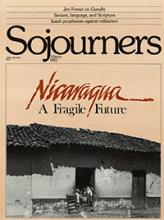When this article appeared, Ambassador Anthony Quainton had had 23 years in the foreign service, although none of his prior experience had been in Latin America. His most recent position had been director of the State Department's Office for Combatting Terrorism. He had begun service as ambassador to Nicaragua in March of 1982.
The U.S. embassy in Managua was the only place in Nicaragua where our tape recorder and camera were taken away. The following is a reconstruction of portions of our conversation with the ambassador.
Quainton: We are concerned about whether the goals of the Nicaraguan revolution are being fulfilled. To continue U.S. aid to Nicaragua, Congress must certify that Nicaragua is not promoting violence or terrorism in any other country. In April, 1981, the new administration cut off aid because Nicaragua is supporting the revolution in El Salvador. We need to limit arms in Central America by everybody.
How then do you justify massive amounts of U.S. military aid and weapons being sent to countries like El Salvador, Guatemala, and Honduras?
We're prepared to reduce if the other side does.
Is the U.S. government involved in covert operations aimed at destabilizing the government of Nicaragua?
I won't comment on that positively or negatively.
Newsweek has outlined a $19 million CIA plan for covert operations against Nicaragua, and this week the U.S. Congress is debating the question of funding for those operations. Is the U.S. government involved in covert operations against the government of Nicaragua?
We are not in the business of trying to overthrow regimes. We would like to see the Nicaragua regime change. The views of the comandantes [Sandinista leaders] are not good for the U.S.
Read the Full Article

